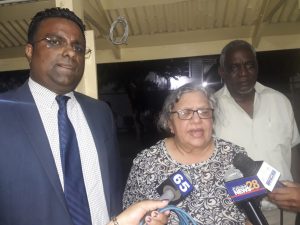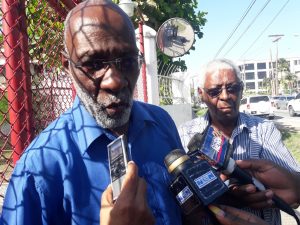No Elections Commission decision on readiness for polls; deadlock on voters’ list clean-up mechanism

PPP-nominated election commissioners Sase Gunraj Bibi Shadick and Robeson Benn.
The seven-member Guyana Elections Commission (GECOM) on Thursday failed to reach consensus on a time-frame by which general elections could be held as a result of the passage of the no-confidence motion last month, leaving the final decision up to the politicians, commissioners said.
A major sticking point is whether a claims and objections period should be held to remove those who should not be on the list of registrants.
Ruling coalition emissary, Amna Ally and her opposition counterpart, Gail Teixeira are expected to meet with the elections commission on Friday to hear first hand from them and then report the outcome to President David Granger and Opposition Leader Bharrat Jagdeo, commissioners from both sides said.
“For the time being, it seems as if there will have to be a political solution. They will have to say to us that ‘well, look we are not holding fast to 90 days starting the 22nd December because we are well into those 90 days without any action so it will require some political maturity on behalf of those politicians,” said government-aligned elections commissioner, Vincent Alexander.
“We move to meet the Whips what everybody is saying that they can go and tell their two principals so that they can get together and make the decision and that the President can call a date for elections…because once an election date is announced GECOM has to meet that date,” PPP-nominated elections commissioner Bibi Shadick told reporters.
Alexander said GECOM Chairman, Retired Justice James Patterson did not exercise his prerogative to put the issue to a vote in which case he would have been required to break the deadlock between the government and opposition commissioners.
Alexander told reporters at the end of the almost three and half-hour long meeting that he and his two other colleagues- Desmond Trotman and Charles Corbin- made out a case for Guyanese to be given an opportunity to object to names currently on the list or request that their names be added.
However, the opposition People’s Progressive Party (PPP) commissioners maintained that the existing voters’ list is legally valid for six months up to April 30, 2019 and so there was no legal need for a claims and objections period. “Never in 2001, 2006, 2011, 2015, 2016 and 2018 when we contemplated the holding of election was there an active list like we have now. I say all of that to say to you that we do not require- that it is not a legal requirement- for any sort of refreshing of the list in terms of house-to-house registration, in terms of claims and objections, in terms of continuous registration. We have an active list,” said PPP elections commissioner, Sase Gunraj.
Just out of local elections last November, the PPP said polling day staff would not require intensive training and GECOM’s permanent staff would also be required to work on polling day.

Government-backed GECOM Commissioners Vincent Alexander and Desmond Trotman.
Noting the opposition commissioners were well aware that elections could not be held within 90 days, he said it has been long documented that 180 days are needed to prepare for emergency elections. Shadick said she presented a timeline showing that elections are “achievable in 50 days”. Alexander told the media that Chief Elections Officer, Keith Lowenfield informed the commission that the time for training staff and other activities would be insufficient for elections to be held in March, 2019.
Alexander said “I don’t fully agree with that” and he cited Guyana’s constitution to prove that Guyanese fundamental rights could be breached. “We are unprepared to have an election in which the citizens are not allowed in one instance on (the list) and thousands are allowed to remain on and, therefore, you have a list which on one hand denies people and on the other brings on to the list or keeps on the list thousands of people who are not resident,” he said.
The government-nominated commissioners had up to earlier this week been pushing for fresh countrywide house-to-house registration because the existing list appeared bloated because it contains about 500,000 names although Guyana’s population is about 745,000 persons.
Alexander cited court records in which commissioner Shadick stated that persons had impersonated voters. “This says that we have accepted that the list is flawed but now they are unprepared to go to an elections with a claims and objections, at minimum, which allows for some cleansing of the list,” he said.
While Guyana’s Constitution provides for elections to be held within 90 days of the passage of a no-confidence motion, it also provides for an extension of that time-frame by two-thirds of the 65 members of the National Assembly.
PPP elections commissioner, Robeson Benn also pointed out that the commission was not presented a draft template to meet the deadline, although the Commission’s administration had been aware of the likelihood of elections since December 21, 2018, the date on which the no-confidence motion was passed.
He said the GYD$3 billion set aside for house-to-house registration could be used to hold general elections and procure supplies from businesses that had sold items for the November 12, 2018 general elections, and train polling day staff everyday instead of only on weekends which would take up the 90 days. Benn accused the Chief Elections Officer and other senior persons of conspiring with others “of one side” to delay the holding of elections. “GECOM set out from since the vote was taken, somehow to do nothing in respect of achieving its constitutionally mandated response in respect of the vote in the National Assembly in December. They have done nothing and they have given us nothing that we can work with conclusively,” he said.
The High Court is expected to rule on the validity of the no-confidence motion on January 31, 2019.
